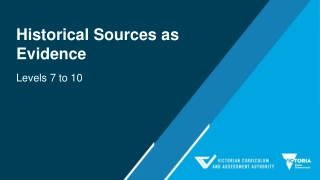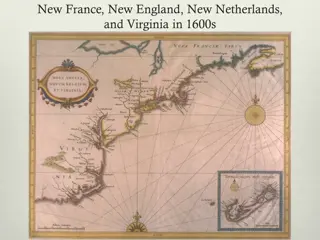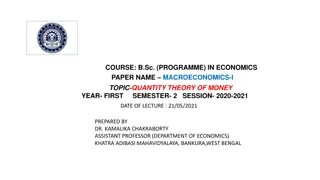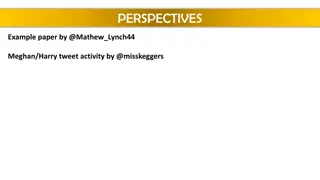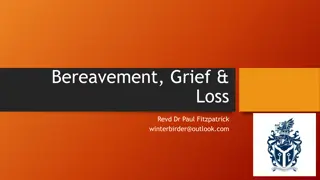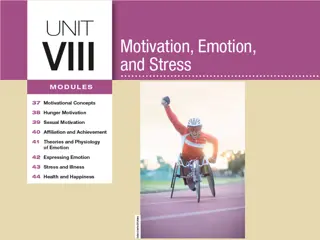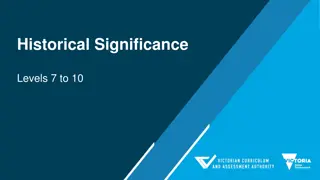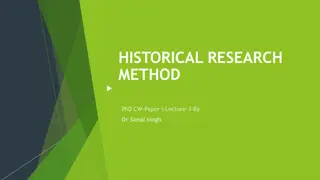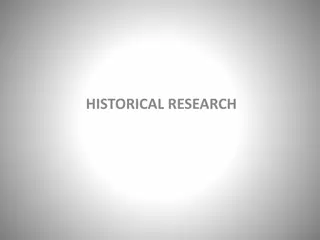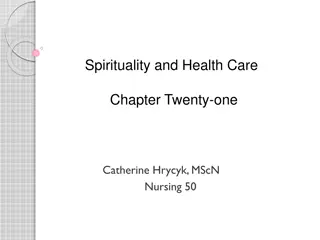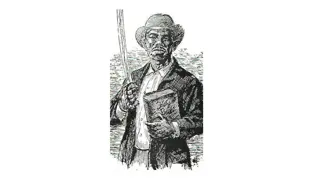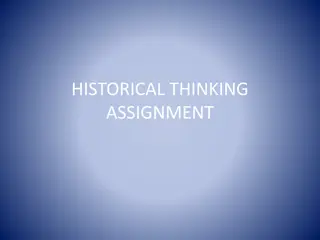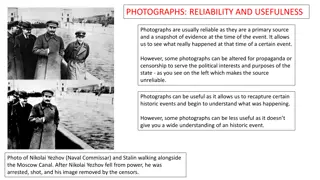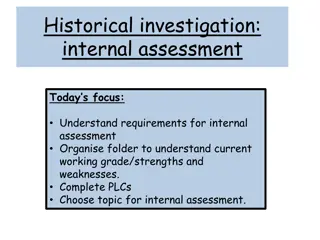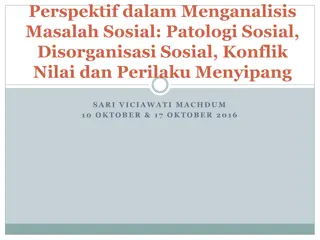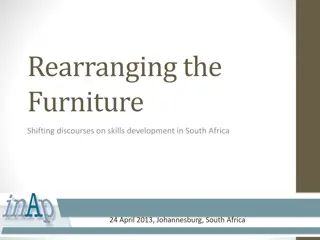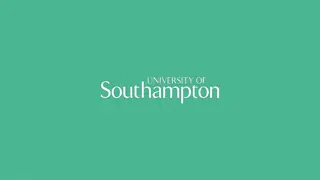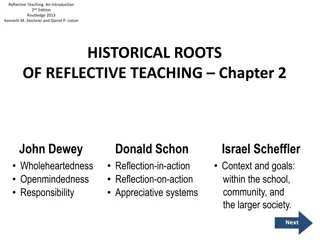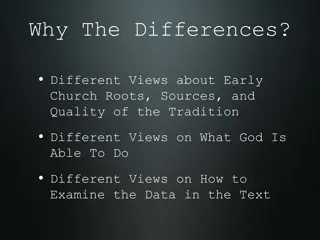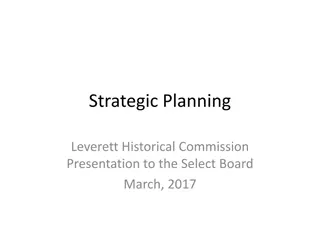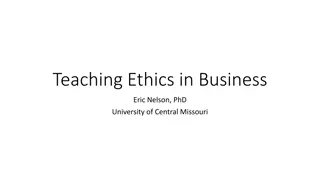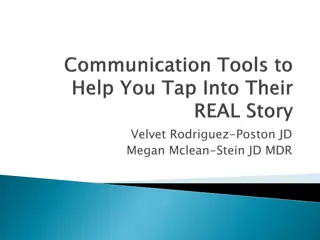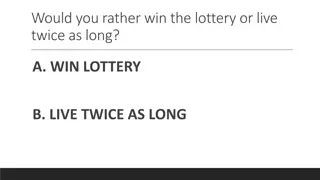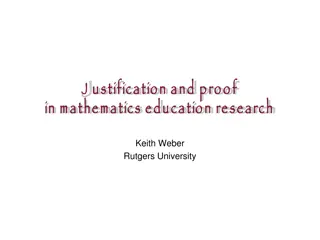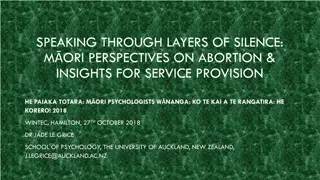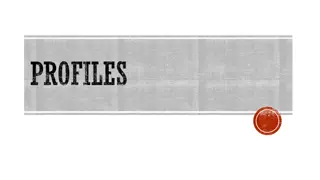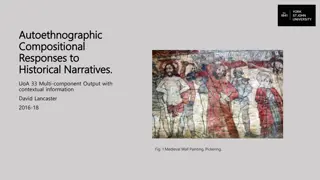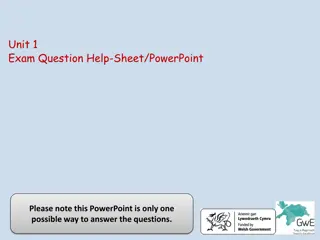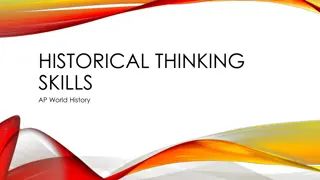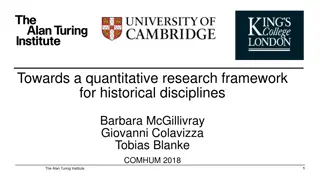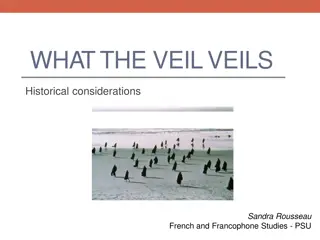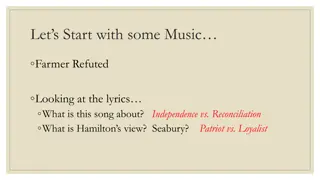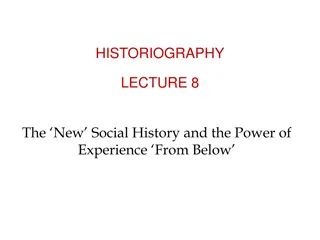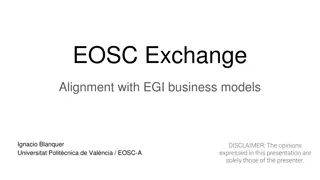Historical Sources as Evidence
Explore the importance of historical sources as evidence in the Victorian Curriculum History context, focusing on how students analyze, evaluate, and utilize sources to create historical explanations and arguments. Discover the significance of primary and secondary sources, perspectives of historica
1 views • 46 slides
Colonization and Indigenous Perspectives in 1600s North America
Explore the colonization efforts in 1600s North America by New France, New England, New Netherlands, and Virginia, along with English settlers' perspectives on Native Americans. Discover the contrasting views on land use, settlement practices, and interactions with indigenous populations through his
6 views • 6 slides
Insights into Energy Transition Research and Historical Perspectives
Explore the intersection of energy transition research with historical perspectives, focusing on the importance of just transitions and the evolving relationship between history and sociology. The discussion delves into key concepts like distributive justice, the role of historians and sociologists,
9 views • 8 slides
Challenges and Solutions in Implementing Historical Competencies in Teaching
Explore the complexities and obstacles faced in implementing historical competencies in teaching, as discussed by Jens Aage Poulsen, a senior lecturer and researcher at HistoryLab, University College Lillebaelt, Denmark. The content delves into competence-based curriculum, core historical competenci
0 views • 7 slides
Understanding the Quantity Theory of Money: Fisher vs. Cambridge Perspectives
The Quantity Theory of Money explains the relationship between money supply and the general price level in an economy. Fisher's Equation of Exchange and the Cambridge Equation offer different perspectives on this theory, focusing on money supply vs. demand for money, different definitions of money,
0 views • 7 slides
Analyzing Perspectives: Writers' Thoughts and Emotions
Delve into the perspectives of writers showcased in an example paper by Mathew Lynch and Meghan/Harry tweet activity by misskeggers. Explore questions on the writers' thoughts, feelings, imaginings, and experiences, and understand how they convey their perspectives through various methods and tones.
0 views • 20 slides
Understanding Bereavement, Grief, and Loss: Historical Perspectives and Contemporary Models
Explore the concepts of bereavement, grief, and loss through the historical perspectives of Freud's Melancholia and Elizabeth Kubler-Ross's Stage Model. Understand the significance of these terms, their impact on individuals experiencing loss, and the evolution of grief and loss models over time.
0 views • 20 slides
Overview of Intelligence Testing in Psychology: Insights and Perspectives
Delve into the fascinating realm of intelligence testing as explored by Dr. Ranjan Kumar, covering the significance of IQ tests, the concept of intelligence, historical perspectives on intelligence measurement, and key figures like Alfred Binet and David Wechsler. Gain insights into the evolution of
2 views • 52 slides
Understanding Motivation: Perspectives and Theories
Define motivation in psychology and explore different perspectives used to study motivated behavior. Learn how needs drive behavior, the interplay between nature and nurture in motivation, and the perspectives psychologists have used including drive-reduction theory and instinct theory. Delve into t
1 views • 32 slides
Understanding Historical Significance in Victorian Curriculum History
Exploring historical significance levels 7 to 10 in the Victorian Curriculum History, this content delves into the importance of evaluating the past, identifying patterns of change, and assessing the influence of individuals and groups. Students learn to analyze causes, effects, motives, and interpr
0 views • 48 slides
Understanding Literary Criticism: A Comprehensive Overview
Literary criticism involves the study, evaluation, and interpretation of literature, focusing on themes, styles, settings, and historical contexts. This discipline explores the meanings, workings, and values of literary works through interpretation, analysis, and evaluation. Various types of literar
2 views • 20 slides
Understanding Historical Research Methods
Historical research is a systematic approach to investigating past events, developments, and experiences. It involves critical examination of evidence, interpretation of sources, and tracing of historical trends to gain insights into social changes. Various definitions by scholars like Kerlinger, Wh
1 views • 21 slides
Approaches to Study Comparative Politics: Traditional vs. Modern Perspectives
This chapter discusses the importance of approaches in the study of comparative politics, categorizing them into traditional and modern perspectives. Traditional approaches include philosophical, historical, and traditional institutional approaches, highlighting their strengths and limitations. Mode
0 views • 7 slides
Understanding Historical Research: Methods, Purposes, and Aims
Historical research involves investigating past events systematically to provide a dynamic explanation, interpretation, and understanding of the past. It aims to uncover unknown aspects, answer unexplored questions, and link past happenings to the present to enrich human culture and encourage interd
0 views • 20 slides
Understanding Spirituality and Health Care in Nursing Practice
Exploring the concepts of spirituality, religious versus secular perspectives, spiritual distress, and the role of nurses in providing spiritual support during times of transition and vulnerability. Spirituality is defined as a sense of meaning in life and inner spirit, central to creating beliefs a
0 views • 11 slides
Remembering Nat Turner: Perspectives from Historical Documents
Explore various perspectives on Nat Turner's legacy through historical documents such as "The Insurrection" by William Lloyd Garrison, "The Confessions of Nat Turner" by Thomas R. Gray, and analyses by scholars like John W. Cromwell and William S. Drewry. The documents shed light on Turner's role as
0 views • 16 slides
Key Historical Events and Perspectives
Explore significant historical moments such as the Kennedy Assassination, the First Moon Landing, and the FLQ Crisis, examining the impact of these events on society and the world. Discover the importance of historical thinking skills in analyzing causes, consequences, continuity, and change, as wel
1 views • 11 slides
Reliability and Usefulness of Historical Sources
Photographs, diary entries, and letters are valuable historical sources, providing insights into past events. While photographs offer a snapshot of the truth, they can also be manipulated. Diary entries reflect personal experiences authentically but may lack objective facts. Letters serve as private
0 views • 11 slides
Requirements for Historical Investigation Internal Assessment
Understand the 25% weightage internal assessment comprising 3 sections for a historical investigation. Focus on source evaluation, investigation, and reflection within a 2,200-word limit. Choose a historical topic, analyze primary and secondary sources, and consider causation, consequence, continuit
0 views • 18 slides
Understanding Social Issues through Theory and Perspectives
Social theory is a system of interconnected ideas that organizes knowledge about the social world. It helps us analyze social problems like social pathology, disorganization, conflicts in values, and deviant behaviors. Differentiating theory, perspective, and model, it's key to note that theories pr
0 views • 37 slides
Understanding Historical Context in Skills Development Discourses
Exploring the evolution of apprenticeship and skills development through historical sociology, historical futures, modes of justification, and complexity concepts. Emphasizing the importance of nuanced historical understanding to navigate contemporary challenges in South Africa's skills development
0 views • 29 slides
Understanding Net Neutrality: Perspectives and Debates
Net Neutrality is the principle that Internet Service Providers (ISPs) should treat all Internet communications equally, without discrimination based on user, content, or source. Various actors hold different perspectives on this principle, with arguments for and against its implementation. Proponen
0 views • 17 slides
Historical Roots of Reflective Teaching: Dewey and Schon's Perspectives
This content discusses the historical roots of reflective teaching, focusing on the contributions of John Dewey and Donald Schon. Dewey emphasized open-mindedness, wholeheartedness, and responsibility as integral to reflective action, while Schon introduced the concepts of reflection-on-action and r
0 views • 6 slides
Understanding Diverse Perspectives on Early Church Traditions and Historical Jesus
Exploring different viewpoints on early church roots, sources, and the quality of tradition, as well as varying beliefs on God's abilities and approaches to analyzing textual data. Delve into the criteria for evaluating historical Jesus materials and considerations of authorship and orality in tradi
0 views • 17 slides
Leverett Historical Commission Strategic Planning Presentation Overview
Leverett Historical Commission identifies issues with ad hoc requests, lack of clarity on historical property significance, and inadequate maintenance plans. A strategic plan is needed to define assets, determine significance, create guidelines, prioritize restoration efforts, and establish funding
0 views • 9 slides
Teaching Business Ethics: Perspectives and Decision-Making
Understanding ethics in business involves exploring different perspectives such as Utilitarianism, Rights-Based, Kantian, and Virtue ethics. Decision-making based on these perspectives requires considering the impact on stakeholders, weighing pros and cons, and aligning personal values with organiza
0 views • 8 slides
Unveiling Truth: The Power of Storytelling in Influencing Perspectives
Stories hold the key to uncovering truths and shaping perspectives. The storyteller plays a crucial role in narrating their account authentically, while the listener's assumptions impact the narrative. Building rapport, genuinely listening, and summarizing are essential steps in revealing the real s
0 views • 34 slides
Understanding Primary and Secondary Sources
Learn about the difference between primary and secondary sources through a quiz based on various historical materials such as Anne Frank's diary, textbooks, interviews, journals, and historical documents like the United States Constitution. Explore the significance of different sources in understand
0 views • 7 slides
Understanding Perspectives and Points of View in Literature
Explore the nuances of perspectives and points of view in literature, from analyzing how characters see the world to understanding authors' purposes. Delve into character perspectives, author viewpoints, and how different narrators shape narratives. See examples from "Touching Spirit Bear" to grasp
0 views • 12 slides
Perspectives on Justification and Proof in Mathematics Education Research
This presentation explores diverse perspectives on proof in mathematics education, highlighting the role of proof in K-12 classrooms and discussing students' challenges with proof. It delves into research perspectives on what constitutes a proof, the goals of mathematics educators, and the link betw
1 views • 74 slides
Mori Perspectives on Abortion: Insights and Challenges
Exploring Mori perspectives on abortion reveals a nuanced narrative that challenges dominant representations. Historical accounts and misrepresentations shed light on a complex reality. The need to attend to Mori reproductive rights in under-researched areas is emphasized, highlighting contemporary
0 views • 22 slides
Unveiling Everyday Life: Captivating Profiles and Perspectives
Delve into intriguing aspects of everyday life through detailed profiles, offering a behind-the-scenes look at unusual activities. Discover new perspectives, bridging cultural gaps and surprising readers with fresh insights. The writer's role as a spectator or participant observer brings depth to th
0 views • 7 slides
Exploring Historical Narratives through Music and Art
This submission presents two original compositions that delve into historical narratives through a unique blend of music and visual art. The compositions aim to reinterpret stories from the past, creating innovative structures and forms. By intertwining various perspectives and utilizing cinematic t
0 views • 8 slides
Historical Source Analysis Exam Questions Overview
The provided content outlines exam questions related to historical sources, guiding students on analyzing, evaluating, and interpreting information from different sources. The questions cover a range of topics such as learning from sources, assessing accuracy, understanding significance, and making
0 views • 12 slides
Developing Historical Thinking Skills in AP World History
AP History classes aim to cultivate apprentice historians by fostering historical thinking skills (HTS). These skills include Chronological Reasoning, Comparison and Contextualization, Crafting Historical Arguments, and Historical Interpretation. Each skill set equips students with the ability to an
0 views • 15 slides
Quantitative Research Framework for Historical Disciplines
Scholarly communities in historical disciplines are combining quantitative and qualitative methods to study phenomena that change over time. The proposed general methodological reflection aims to enhance research in historical linguistics through quantitatively driven models and claims. Quantitative
0 views • 18 slides
Exploring the Veil Debate in France: Historical Perspectives
Delve into the intricate historical considerations surrounding the veil debate in France, analyzing its political, social, and cultural dimensions. Explore the evolution of terminology, significant laws, the impact on the school system, France's historical relationship with religion, and the process
0 views • 21 slides
Perspectives on Independence and Trade During the American Revolution
The provided content delves into various themes surrounding the American Revolution, including perspectives on independence versus reconciliation, the role of Great Britain in the colonies' survival, and Thomas Paine's influential pamphlet "Common Sense." It discusses Hamilton's view on independence
0 views • 13 slides
The Evolution of Social History: Power of Experience from Below
Explore the transition in historiography from the Annales school to the New Social History, emphasizing the focus on experience and culture from the 1930s to the 1960s. Key figures such as Edward Palmer Thompson and Christopher Hill reshaped historical narratives with their emphasis on grassroots pe
0 views • 21 slides
Exploring EOSC Exchange Horizontal Services and Funding Perspectives
Exploring the EOSC Exchange's alignment with EGI business models, the set of federation services registered to EOSC, managed services for EOSC procurement, user perspectives on application workflow management, and funding perspectives for horizontal services. Key points include the importance of sus
0 views • 7 slides
